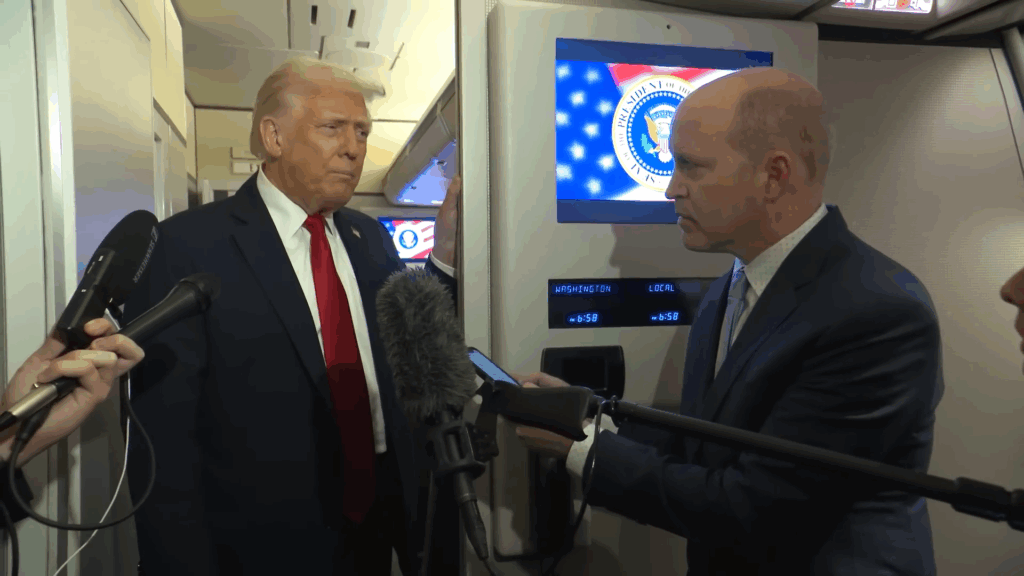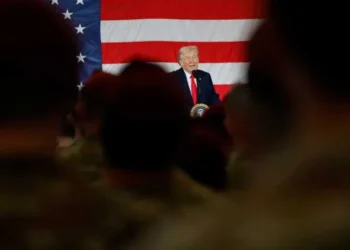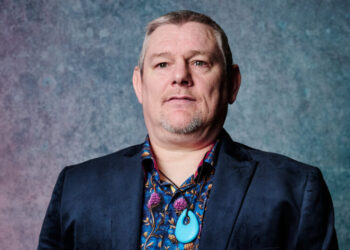KYIV — President Donald Trump’s demand that Ukraine sign a deal by Thanksgiving appears to have softened as he leaves some of the most important details of the peace plan in the hands of his envoys, one of whom was just embroiled in a high-profile phone leak.
A recording of an alleged phone call between Trump’s special envoy Steve Witkoff and a top aide to Russian President Vladimir Putin from October appears to show the envoy advising the Russians on their negotiating strategy.
Trump postponed an expected meeting with Ukrainian President Volodymyr Zelensky ahead of Thursday’s deadline, when he had initially threatened to cut off all support to Ukraine if it was not met. On Tuesday, Trump said he was not ready to meet with Zelensky or Putin.
“I look forward to hopefully meeting with President Zelenskyy and President Putin soon, but ONLY when the deal to end this War is FINAL or, in its final stages,” Trump wrote on social media.
The change in stance offered some relief and could give Kyiv time to strengthen its position before an extremely high-stakes meeting with its most important — and most unpredictable — partner. But the delay could also thwart Ukraine’s hopes to hammer out agreeable terms on the most sensitive issues of the deal without Russian influence.
Trump’s comments Tuesday also cast doubt on U.S. assessments from earlier that day that the Ukrainians had agreed to a deal, barring some minor details. Zelensky had, in fact, reserved one of the most sensitive points, on potential Ukrainian territorial concessions, as a topic that only he can discuss at the leader level.
Trump’s decision to send Witkoff to Moscow to meet with Putin will also carve out space for the Kremlin to reject the latest version of the plan — or get through to Trump before Kyiv can.
After the publication of the alleged phone call — in which Witkoff is heard advising a Russian official on how Putin should sell a plan to Trump involving Ukraine surrendering territory — the senior Kremlin official involved said Wednesday that someone was listening in and releasing confidential phone conversations over the Ukrainian peace process.
Asked by Kremlin reporter Pavel Zarubin whether the recording — first reported by Bloomberg — was fake, Putin aide Yuri Ushakov did not answer directly but said that he spoke to Witkoff often and that he would not comment on the substance of confidential conversations. However, he acknowledged that tapping and leaking was occurring.
Asked where the information came from, he said, “I don’t know. Someone is listening in. Someone is leaking information. But it’s not us.” Ushakov said the object of the leaks was to obstruct the peace process and hamper U.S.-Russia relations.
“It is unlikely that this is being done to improve relations. They are currently being established. It is difficult to establish them; they are being established including through such telephone contacts,” he said.
Trump said that he had not heard the recording but called Witkoff’s approach “a very standard form of negotiation.” The leak is causing further consternation among Republican lawmakers, many of whom had criticized the 28-point peace plan first presented by Washington as appeasing Russia. On Tuesday, Don Bacon, a Republican lawmaker from Nebraska, said Witkoff should be fired and could not be trusted with handling the peace talks.
“For those who oppose the Russian invasion and want to see Ukraine prevail as a sovereign & democratic country, it is clear that Witkoff fully favors the Russians.” Bacon wrote on X. “He cannot be trusted to lead these negotiations. Would a Russian paid agent do less than he? He should be fired.”
Trump told reporters on Air Force One on Tuesday that his son-in-law Jared Kushner may also join Witkoff in Moscow.
U.S. Army Secretary Dan Driscoll will continue meeting with the Ukrainian side, Trump said.
The parallel negotiations aim to solve a difficult problem at the center of any effort to end the war: The two countries’ red lines for ending it have long been incompatible.
The 28-point plan that Driscoll presented to Zelensky in Kyiv last week was badly received by Ukraine and its allies, including Republicans on Capitol Hill, who described the document as a total capitulation to Russia.
A Ukrainian delegation spent a frenzied weekend in Geneva meeting with top U.S. officials, including Secretary of State Marco Rubio, and rewriting the plan. By Monday, it had been slimmed down and appeared more acceptable to Ukrainians, several officials said.
A Russian delegation then met with U.S. officials in Abu Dhabi, where a different group of Ukrainian officials had also gathered.
Ushakov confirmed that officials from Russia’s intelligence services met Tuesday in Abu Dhabi with a “new U.S. representative who is now dealing with Ukraine dossier,” an apparent reference to Driscoll, but he said that the latest plan was not discussed. They also met with officials from the Ukrainian security services to discuss sensitive issues including prisoner exchanges, he said.
“The peace plan has not yet been discussed in detail with anyone. We have seen it, it has been passed on to us, but there have been no discussions yet,” he said, referring to the latest plan.
In a sign that Russia is unlikely to accept the new plan, Ushakov called Europe’s “meddling” in the process completely unnecessary.
Russian officials have repeatedly sought to delegitimize any European role, describing Ukraine’s Western allies as “warmongers” who don’t want peace.
Kremlin spokesman Dmitry Peskov said on Tuesday that the 28-point plan — which Putin said could form the basis for a peace deal — was the “only substantive document today,” while Foreign Minister Sergei Lavrov said any departure from terms discussed with Trump at his August summit with Putin in Alaska would be problematic.
Early Tuesday morning, Russia bombarded Kyiv and several other regions with ballistic missiles and drones, killing seven people in the capital. Zelensky said it was “particularly cynical that Russia carries out such attacks while discussions on how to end the war are ongoing.”
On Tuesday, French President Emmanuel Macron, alongside other European officials, reiterated proposals to send forces to Ukraine in a future settlement of the war with U.S. backing — an idea Russia has rejected. Macron said soldiers from France, Britain and Turkey could be deployed as part of a “reassurance force” on the “day the peace is signed.”
European officials have engaged in a flurry of diplomacy in recent days to close ranks and sway the negotiations to protect their interests as the Trump administration pushes for a peace deal. Macron spoke after a meeting of the “coalition of the willing” — led by France and Britain — which Zelensky and Rubio joined virtually on Tuesday.
Macron told the meeting that Ukraine’s key backers would keep working on plans for security guarantees in the event of a deal, including working with Washington and NATO on the issue of ceasefire monitoring “through surveillance and imagery.”
Still, he said, “the main question remains, once again, whether Russia has any real intention of moving toward peace.”
Francis reported from Brussels and Dixon from Riga, Latvia. Catherine Belton in London contributed to this report.
The post Trump steps back from Ukraine peace process, sends out envoys appeared first on Washington Post.




